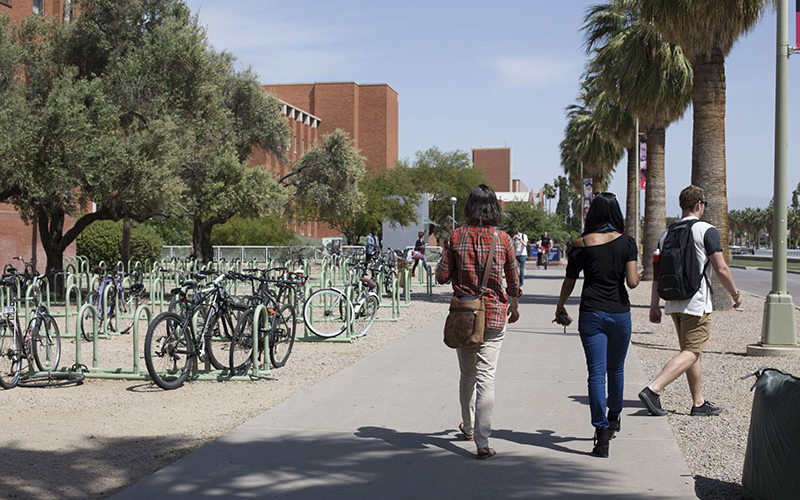- Slug: BC-CNS-Title None,780
- File photo available (thumbnail, caption below)
By Reagan Priest
Cronkite News
WASHINGTON – The University of Arizona cannot be held liable under Title IX for a football player’s off-campus assault of his girlfriend, even though the university exercises “substantial control” over its student athletes, a federal court said Tuesday.
A divided three-judge panel of the 9th U.S. Circuit Court of Appeals rejected the girlfriend’s argument that university officials could have prevented her assault by acting on previous reports that Orlando Bradford assaulted other women on campus.
The panel majority said that while the university had control over Bradford, that did not extend under Title IX – which prohibits student-on-student assault, among other things – to actions he took while off-campus.
“While (the victim’s) anger with how the university handled the reports of Bradford’s abuse of other students is understandable, her argument stretches the text of Title IX and the implied private action that the Supreme Court has recognized too far,” Circuit Judge Danielle Forrest wrote.
But Judge William Fletcher, who called the last of the assaults “extremely violent,” dissented, arguing that the university controlled the “context” of where the off-campus assaults took place because coaches controlled where football players were allowed to live.
“It is clear, on the facts of this case, that the University had control over the context in which Bradford assaulted (the victim),” Fletcher wrote.
Attorneys for the victim, as well as the university and Arizona Board of Regents, which was also named in the suit, did not immediately respond to requests for comment Tuesday.
The suit was one of two filed by Bradford’s victims against the university for its failure to take action against him, even though university employees were told of his assaults of women as early as 2015, his freshman year.
According to court documents, Bradford repeatedly assaulted one woman he was dating during his freshman year, choking her on several occasions and leaving her with a black eye at least once. The incidents were known to resident assistants, coaches and Title IX coordinators on campus, and football coaches got involved after a drunken Bradford pounded on the woman’s door early one morning for two hours, shouting demands to be let in.
A second student was assaulted in spring 2016, leading to more reports to university officials. Despite their knowledge, the incidents were not reported to the athletic director or head football coach, who later allowed Bradford to live in the off-campus apartment in which the final assault occurred.
In testimony, the victim described a series of assaults over the course of the summer, culminating in two days in September 2016 during which she described Bradford kicking, choking and dragging her by her hair. Fletcher cited a medical report that said she was left with “burst blood vessels in the eye, bruising on the lower part of the neck, (and) likely concussion,” among other injuries.
Bradford was arrested Sept. 14 and expelled from the university a month later. The second victim’s mother, hearing of his arrest, filed an anonymous report with Tucson Police. He was charged in both cases and pleaded guilty to aggravated assault and domestic violence, receiving a five-year sentence in November 2017.
The two victims separately sued the university in 2017 under Title IX, the federal law that prohibits gender discrimination in educational institutions. The law allows schools to be sued for student-on-student harassment, but the Supreme Court has ruled that universities can only be held responsible if they have control over both the actor and the context in which the abuse occurred.
A district court ruled in the second victim’s case that she had shown that the university “exercised substantial control over the ‘context’ of Bradford’s abuse … including abuse that took place off-campus.” She settled with the university before trial.
But a district judge in the third victims’ case disagreed, saying she had not offered any evidence that the university “exercised control over the context in which her abuse occurred” and could not, therefore, be held liable.
The circuit court agreed, saying that just because the university controlled Bradford it is “not enough by itself to establish that the school controls the locations or contexts where the student is found.”
But Fletcher said the key consideration is whether the university maintains control, whether the setting is a playground, “an off-campus field trip, an off-campus research project in a laboratory not owned by the school, or an off-campus residence for which the school pays the rent and where students reside with permission of the school.”
“If the harassment occurs in such a setting – that is, in a ‘context’ over which the institution has substantial control – the institution may be held liable for deliberate indifference under Title IX,” Fletcher wrote.
For more stories from Cronkite News, visit cronkitenews.azpbs.org.
^__=
Web links:
_ Court ruling: https://cdn.ca9.uscourts.gov/datastore/opinions/2022/01/25/20-15568.pdf
_ Title IX: https://www.justice.gov/crt/title-ix-education-amendments-1972
^__=
Students walk across campus at the University of Arizona in this 2020 file photo. A federal appeals court ruled Tuesday that the university cannot be held liable under Title IX for an assault committed off-campus by a football player against another student. (File photo by Emily L. Mahoney/Cronkite News)
